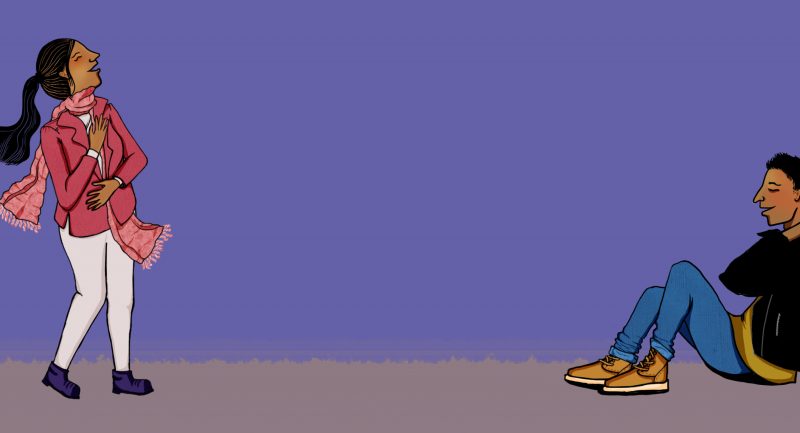
‘Let’s listen’ writes Amit Majmudar as he begins to masterfully play out each note of the Godsong. Stretched taut with layers of meaning, each artful stroke plays on the chords of our shared humanity and pulsates with vivid emotions of deeply lived relationships. This is a song of dichotomies, dualities and multiplicities that weave a web of dilemmas that all human beings must battle through to reach their truth and to achieve their higher self. As man struggles to find light in this darkness, there is Krishna playing his magical melody while Arjuna, the greatest warrior, learns to sing along. Together on the battlefield, God in his human form and man in his search for godly wisdom set the stage for a friendship that levels all hierarchy.
Sanjaya said,
Having said this to Krishna,
Arjuna, the scorcher of foes,
Said, “I will not fight,”
And went silent
“Sanjaya, who has the power to witness events without being physically present for them, narrates the action. Arjuna tells Krishna how he feels and how he has a horror of fighting his own relatives. Arjuna throws aside his weapons and sits down.”
No one for an instant ever really
Stands there doing nothing.
Gunas, born of nature, make
Everyone do things, even if unwilling.
“Krishna explains that everyone has to act in some way. You can do nothing, but you cannot not do. Even inaction is a kind of action and bears a karmic charge.”
Pierced by infinite pity,
In despair, he said,
“Seeing this— my own people, Krishna—
Drawing close because they’re dying to fight. . . .
“Arjuna’s despair arises from the conflict between his dharma as a family member and his dharma as a warrior. The Gita is occasioned by a moment of supreme tension between these two simultaneous definitions of dharma. An action which may seem personally adharmic (shooting your own cousins, in Arjuna’s case) can uphold the larger dharma.”
While the unwise work from their attachment
To action, Arjuna, a sage
Should work without attachment,
Longing to hold the world together.
“Just as Krishna sustains the universe, Arjuna must sustain a dharmic society. To do this, both of them must act. Yet these actions must be carried out with detachment, and with the focus on the task itself.”
For the unattached and free
Who fix their minds in knowledge,
Action, working toward
Sacrifice, dissolves entirely.
“Krishna describes the ideal man of action, with a focus on his detachment, and how he “accrues no guilt.” Such a yogi’s work in the world takes on the nature of sacrifice— an offering to the Gods. He goes on to praise yogic knowledge and how it dissolves karma.”
His happiness within, his ease
Within, and hence his light within,
This yogi goes up to extinction
In Brahman, becomes Brahman.
“Once the yogi attains extinction in Brahman, he sees all things and people as fundamentally equal because they are fundamentally the same. That is nirvana, a state of bliss and peace (…).”
Bound by your own karma,
Born to your own nature,
What you in your confusion do not want
To do, you will do. Even against your will.
“Krishna exhorts Arjuna to take refuge in him, insisting that Arjuna is going to fight this war anyway, even against his will.”
Does Arjuna awaken to his Dharma? Read Godsong to find out!









